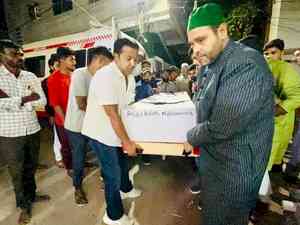Ambala man donates kidney to save his wife life
Author(s): City Air NewsA related photograph. Ambala, April 17, 2015: True to husband –wife bond, an Ambala man donated his kidney to save his wife life. Now both Anil Chauhan (35) and his wife Rani Chauhan (28) share a living part of...


A related photograph.
Ambala, April 17, 2015: True to husband –wife bond, an Ambala man donated his kidney to save his wife life. Now both Anil Chauhan (35) and his wife Rani Chauhan (28) share a living part of each other in their bodies. The transplant surgery which took place last month at Max Super Specialty Hospital (MSSH), Mohali was lasted for over 3-hour. It was performed by a team of doctors comprising of Dr Munish Chauhan, Sr Consultant Nephrology and Dr Jagdish Sethi, Consultant, Kidney Transplant.
Addressing a press conference at Hotel A. P. Regency, Ambala today , Anil said that he could not watch his wife died after she developed chronic kidney disease 3-months ago He was desperate to donate his kidney and help her.
Ironically Rani own blood relatives did not bail her out but her husband backed her. Rani entire family was confused except her mother who wanted to donate kidney but could not do so as she had kidney stones and thus was not a suitable donor. Her relatives were too in double mind.
Dr. Munish Chauhan informed that most times, patients could find a suitable live donor within the family. Getting the organ from brain-dead patients was difficult. Usually, live donors were wives or aged mothers. In fact the parents were unwilling to accept kidneys from their children. There was immense social pressure involved in donating within the family. Moreover the Human Organs Transplant Act, 1994, would demand an entire family's consent for any member to donate his or her kidney to another member, he pointed out.
Dr Jagdish Sethi informed that need for kidney transplant in India was immense. Up to 600,000 patients required kidney transplants ever year. They would suffer from end-stage chronic kidney disease. "Only 1% only ended up getting a kidney. Another 2% were on dialysis. We did not know what happen to the rest of the 97%.”
Ironically Haryana has a high rate of female foeticide and gender discrimination. It ranks a poor 31 among Indian states and union territories on sex ratio with just 877 women per 1000 men. By donating his kidney to his wife, Anil has set an example for the society in large.
Meanwhile Max hospital Mohali has emerged as a fastest growing centre for kidney transplant in north India. It has completed 175 kidney transplants in last 18 months with excellent patient and graft survival rates. Around 40% of Max patients are from Haryana.
Date:
Friday, April 17, 2015

 cityairnews
cityairnews 














